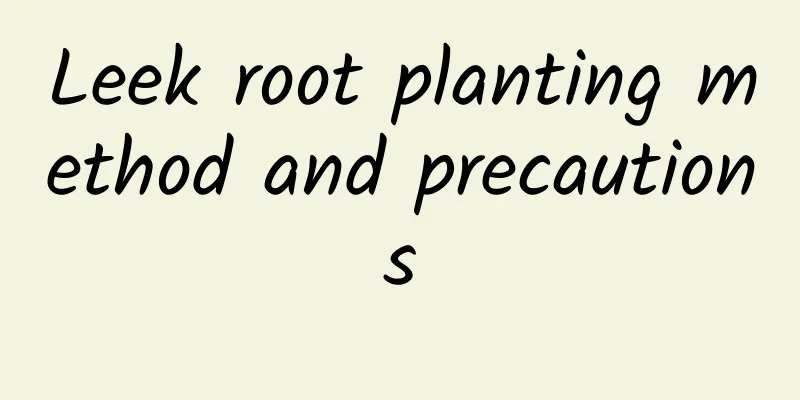Leek root planting method and precautions

When to plant leek rootsChives have a certain degree of cold resistance, but are not resistant to high temperatures. They can be sown at any time from the time the soil thaws to the autumnal equinox, which is around March to May. It is best to sow in spring, and it is better to sow in summer early rather than late. Leek root planting methodLeek roots can be propagated sexually and asexually. Sexual propagation mainly involves sowing seeds and raising seedlings, but this method is basically not used in life. The most commonly used method is transplanting, which is asexual propagation. The specific planting method is as follows: 1. Site selection: Chives are highly adaptable to soil, but if you choose the right soil, the growth rate will be faster. It is best to choose an area close to a water source. Secondly, the land’s water storage capacity and fertility must be better. 2. Planting: When planting leeks, the distance needs to be controlled. Generally, three seedlings are placed in each hole. The plant spacing is generally 15 to 20 centimeters, and the row spacing is 25 to 30 centimeters. 3. Harvesting: The yield of leek is not high in the first two years after planting. After about the fourth year, the yield will slowly increase, and then slowly decrease after about 10 years. Therefore, in order to maintain a good yield, transplanting can be carried out after each harvest, so that the yield can continue to increase continuously. Leek root care and management1. Fertilizer and water management The temperature gradually drops in autumn, which is good for the growth of leeks. Before the leeks grow rapidly, heavy topdressing should be carried out. You can push the leeks to both sides, open a small ditch in the middle, and then put bean cake fertilizer, cover it with soil, and water it heavily after fertilizing. 2. Stop mowing to prevent falling Stop harvesting during the root growth period of leeks. The growth rate will be faster, but they are prone to lodging and often suffer from diseases and leaf rot. Therefore, you can build racks on both sides of the leeks to prevent them from lodging. This is conducive to ventilation and light transmission in the field, maintaining vigorous photosynthesis of leeks, promoting the growth of leeks, and reducing the occurrence of diseases and pests. 3. Disease and pest control Chives are prone to diseases and pests in a high temperature and high humidity environment. Common diseases are blight and gray mold, which can be killed by spraying with carbendazim and triadimefon. Common insect pests are mainly leek maggots and thrips, which can be watered along the leek roots with cypermethrin emulsifiable concentrate, or Lorsban emulsifiable concentrate can be diluted with water per acre. |
<<: Where do wheat seeds come from?
>>: When is the best time to plant plum blossom seeds?
Recommend
What flowers are there in spring
1. Hyacinth Hyacinths usually bloom in March and ...
When is the best month to prune peony flowers? When is the best month to prune branches and leaves?
Peony pruning time The pruning of peonies is main...
The breeding methods and precautions of Brazilian dragon bone
1. Breeding methods 1. Temperature: It prefers a ...
How to grow Staghorn Begonia in winter? It will grow very well if you do this!
Growth habit It is best to provide the Staghorn B...
The correct process of water-growing garlic sprouts
1. Prepare the container Before planting, prepare...
Autumn is here, quickly add some of “it” to the pot of “Kalanchoe”, and the flower buds will unstoppably bloom!
Many friends need plants to embellish and decorat...
Common diseases of lotus bamboo and their prevention and control methods
Common diseases of lotus bamboo: Anthracnose Symp...
How to fertilize the money tree in spring
1. Relatively abundant fertilizer can make its le...
How to spend the summer with spring and autumn type succulents
Spring and Autumn Type Medium Succulent Spring an...
How to plant and care for aloe vera?
Aloe vera has thick green leaves that are lush an...
When is the right time to plant climbing bougainvillea?
Climbing Bougainvillea is a climbing plant, which...
Cultivation methods and precautions of monkey face flower
How to grow monkey face flower soil To grow monke...
Spring Horse Beheading Method
1. Prepare tools Before beheading the spring ju, ...
What seeds are suitable for sowing in autumn (plants and flowers suitable for sowing in October)
October is here, and many flower lovers have star...
When do grapes ripen?
1. Time to mature There are many varieties of gra...









